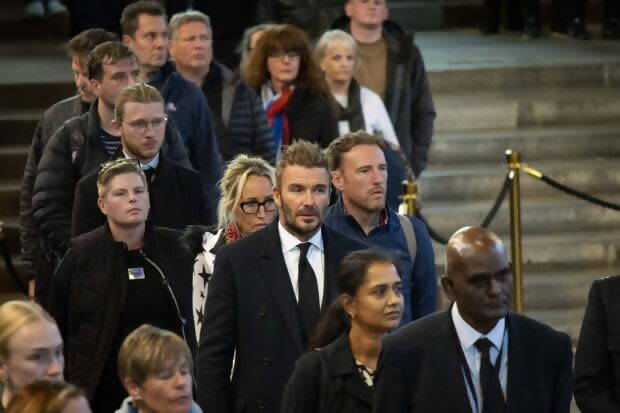
From Golden Boy’s golden decorum queueing for 13 hours to see Queen Elizabeth II’s lying-in-state (contrasted with Holly and Phil snubbing the plebs), to Russia’s first McDonalds.
Holly Willoughby and Phillip Schofield skipped ‘The Queue’ to see Her Majesty Queen Elizabeth II’s lying-in-state and lots of people are upset about it. The This Morning presenters Willoughby and Schofield allegedly queue jumped, with the former speaking to her lawyers on Saturday over the ‘damaging’ accusations. But if Domino’s Pizza is offering their two cents, then here’s mine.
Apologies to anyone waiting on their pizza, we've just received an order from Holly and Phil #ThisMorning
— Domino's Pizza UK (@Dominos_UK) September 20, 2022
Holly and Phil were at pains to make clear that they were only queue jumping ‘strictly for the purpose of reporting on the event for millions of people in the UK who haven’t been able to visit Westminster in person’, according to their public apology (two stars, not enough ‘sorry’) on This Morning. It was all a noble – too noble, if anything – attempt to better the lives of ‘millions’. Ever heard of the greater good?
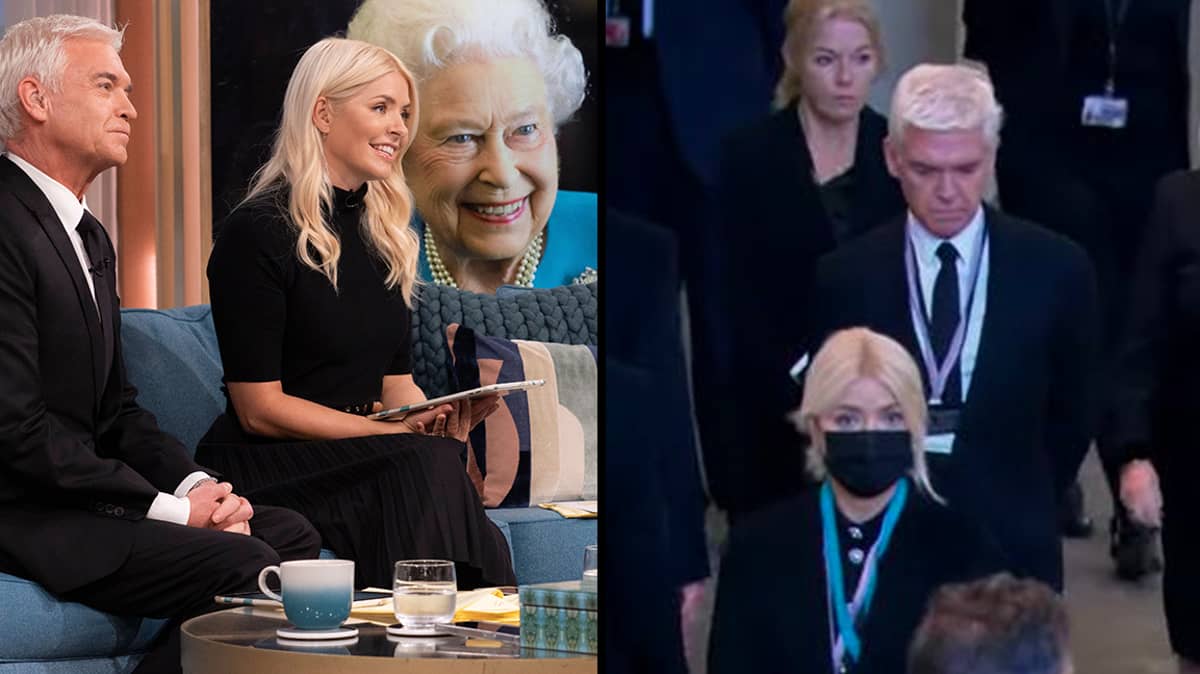
This Morning presenters Holly Willoughby and Phillip Schofield are alleged to have skipped the queue, much to the ire of the British public
‘The rules were’, they explained, ‘that we would be quickly escorted around the edges to a platform at the back. In contrast,’ they said, remembering to use one of the more formal transition phrases from English lessons, ‘those paying respects walked along a carpeted area beside the coffin and were given time to pause.’ Plush carpet under their feet? Time to pause? How the other half live, eh?
‘The Queue’ at Wimbledon
To be fair, it sounds like ‘the rules’ were a bit vague. While most people know that ‘to queue’ means ‘to wait in a line of people to get something or somewhere’, Wimbledon – the original visionaries who first capitalised their queue as ‘The Queue’ – have learned, over the years, to cover all bases. To avoid any snafus, Wimbledon has a 34-page ‘Guide to Queueing’, which is updated every year.
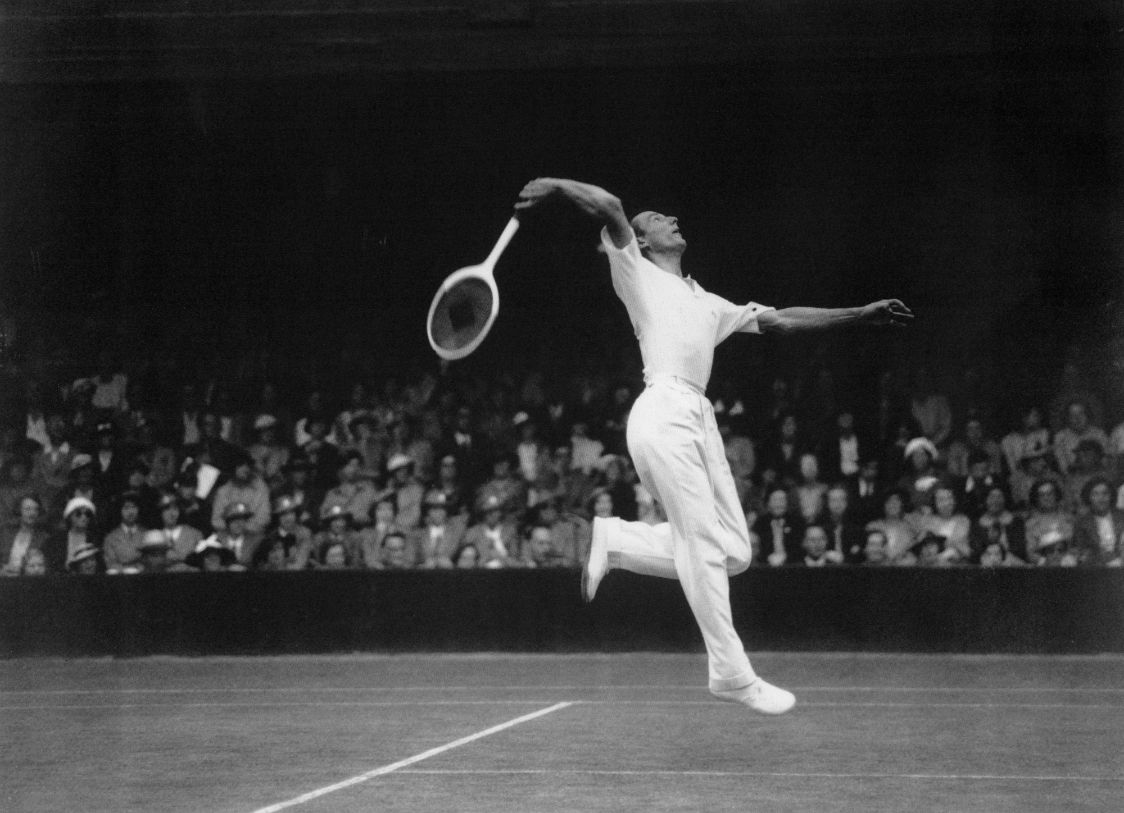
Fred Perry against BH Grant, court one Wimbledon, London, 1936
This year’s contents included subsections on ‘The Queue’, ‘How to Join The Queue’ and ‘The Queue Code of Conduct’. It’s a fascinating read. ‘You are in the Queue if you join it at the end’ reads page 26. If only Holly and Phil had been provided with such a document, all this could perhaps have been avoided.
Yet, despite the lack of any supporting literature, former England captain David Beckham somehow intuited that to queue, one must turn down the opportunity to jump it. Instead, he joined it ‘at the end’, waited 13 hours with the general public and brought everyone doughnuts – exactly the kind of foresight that earned him his captaincy.
A 2017 study by Swiss International Air Lines found that we spend the equivalent of 52 working days in a lifetime queueing. As such, you might as well make the most of it and have a good time. Maybe take a leaf out of Becks’s book and hand out some sweetened dough.
George VI
The ‘fun’ of queuing was remarked upon by a TIME journalist writing in 1952 on the immense crowd known as ‘The Great Queue’ who flocked to Westminster Hall for the Lying-in-State of Queen Elizabeth II’s father, George VI. ‘Under the reign of George VI,’ the article reads, ‘Britons learned to queue—tediously and inevitably—for food, for fun, for clothing, for travel, for life’s necessities and life’s rewards.’ A total of 305,806 people queued for King George.
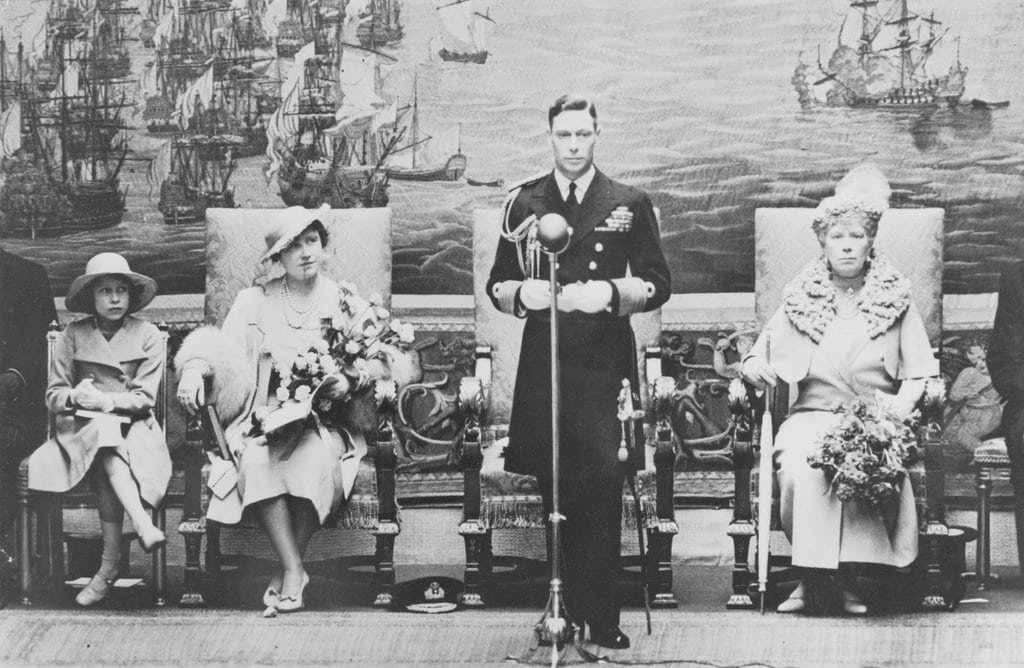
King George VI speaking in Neptune Hall during the formal opening of the National Maritime Museum on 27 April 1937. Seated, from the left, are Princess Elizabeth (Queen Elizabeth II after 1952), Queen Elizabeth and Queen Mary (widow of King George V).
John F. Kennedy
The TIME journalist needn’t have been so sassy about us Brits. As much as our penchant for an orderly line seems to say so much about our Stoicism (perhaps masochism), a decade after King George, the United States experienced its own sad loss. Following John F Kennedy’s assassination in Dallas, Texas on 22 November 1963, approximately 250,000 people were recorded as having viewed the late President’s casket in a line that stretched for three miles.
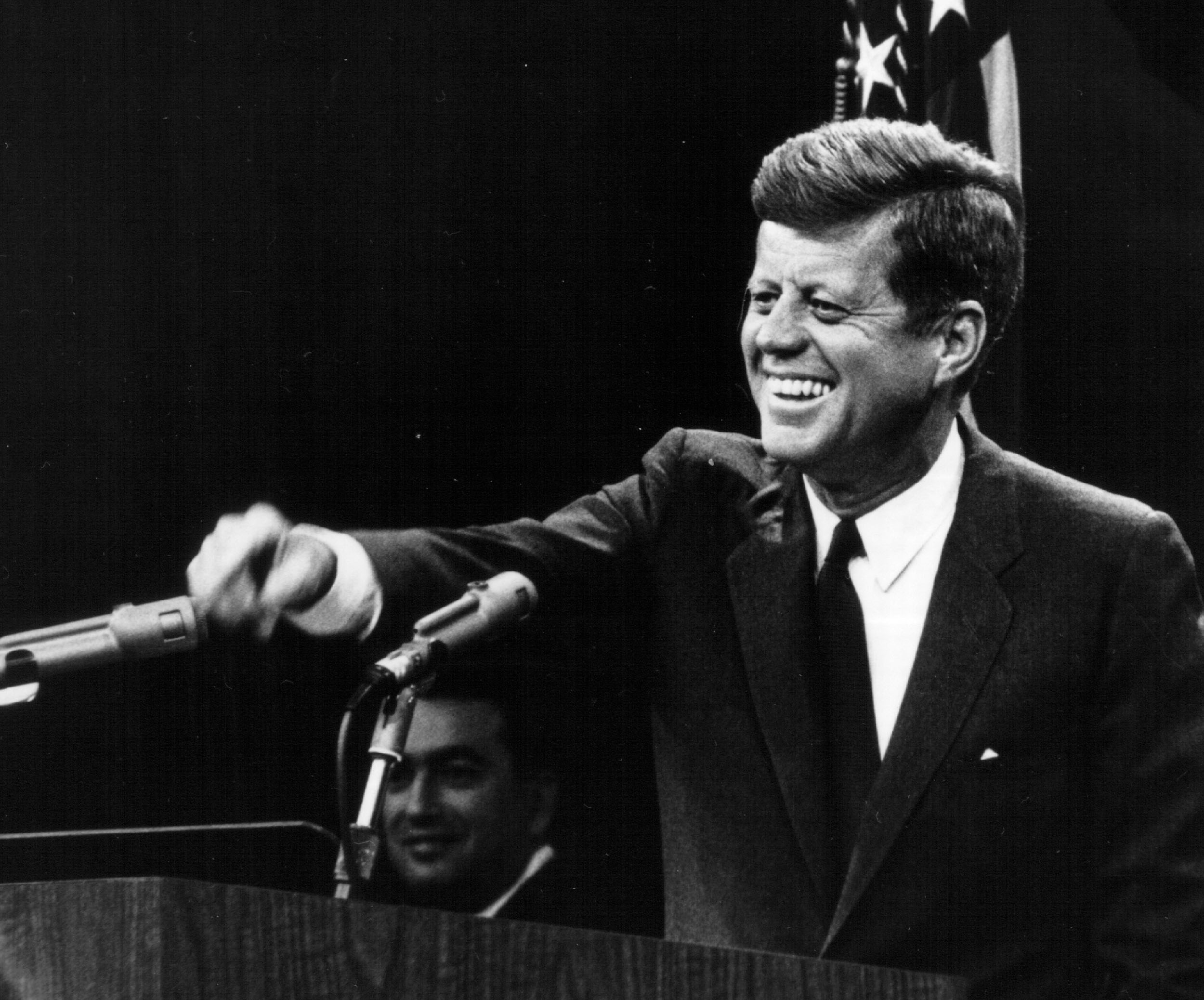
President John F. Kennedy laughs during a press conference August 9, 1963. (Photo by National Archive/Newsmakers)
Beatlemania
1963 was the same year Beatlemania took hold. ‘The Beatles are coming – and just dig that crazy queue,’ Newcastle’s Chronicle newspaper reported the same year. Thousands of teenagers turned out for a 48-hour wait. Schoolgirl Shirley Chrystal, 16, was keen to make clear: ‘If anyone screams, I’ll go mad. Anyone who thinks we are camping on a cold pavement for two days just to see their handsome looks are mistaken. We just like the sound they make.’ Understood, Shirley.
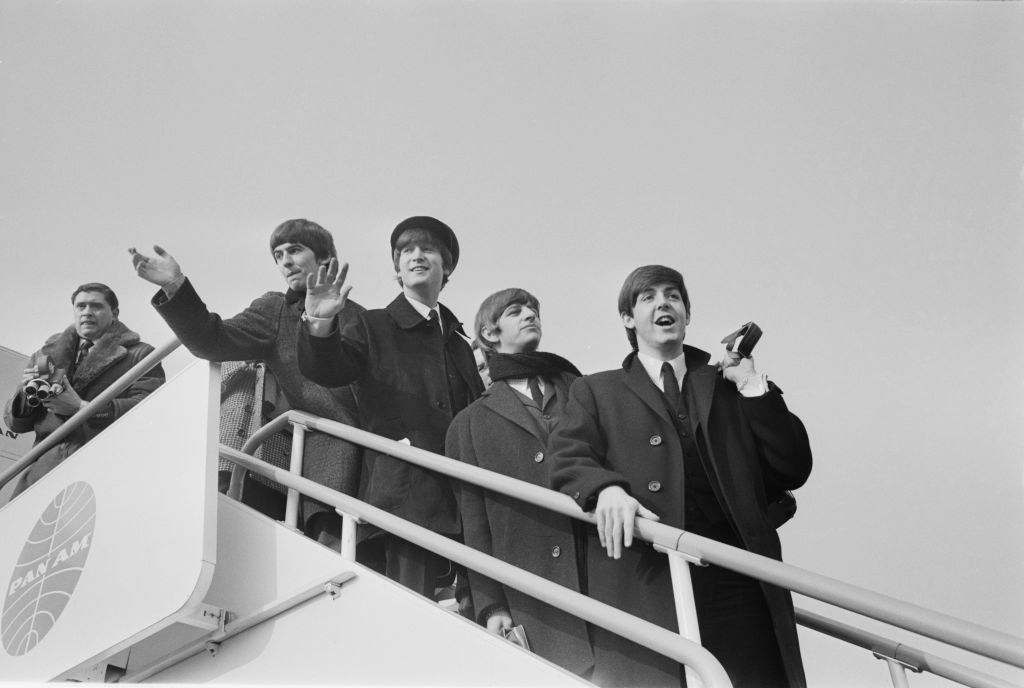
The Beatles at London Airport, en route to America, 13th February 1964. From left to right, a photographer, George Harrison, John Lennon, Ringo Starr and Paul McCartney. (Photo by Stan Meagher/Express/Hulton Archive/Getty Images)
The Origins of Queueing
The first written description of the phenomenon is testament to the excitement a queue can stir in the British heart. ‘If we look now at Paris, one thing is too evident’ writes the Scottish essayist Thomas Carlyle in 1837:
that the Baker’s shops have got their Queues, or Tails; their long strings of purchasers, arranged in tail, so that the first come be the first served,—were the shop once open! This waiting in tail, not seen since the early days of July, again makes its appearance in August. In time, we shall see it perfected by practice to the rank almost of an art; and the art, or quasi-art, of standing in tail become one of the characteristics of the Parisian People, distinguishing them from all other Peoples whatsoever.
Carlyle, writing in his book The French Revolution: A History, marvels at the new values of Liberté, égalité, fraternité, ‘the first come be the first served’ and, mind blown by the weirdness of the human tail, he elevates queueing to an art form.
Queues in the Soviet Union
It’s from the Soviet Union that we get the word ‘breadline’ – for historian Peter Gatrell, this failure to provide the USSR with bread was typical of its ‘economy of absolute shortage’. Here, the phrase ‘First come, first served’ came very close to a social Darwinist principle (useful context for understanding why 30,000 visitors turned up for the grand opening of the first McDonald’s in Soviet Russia on 31 January 1990).
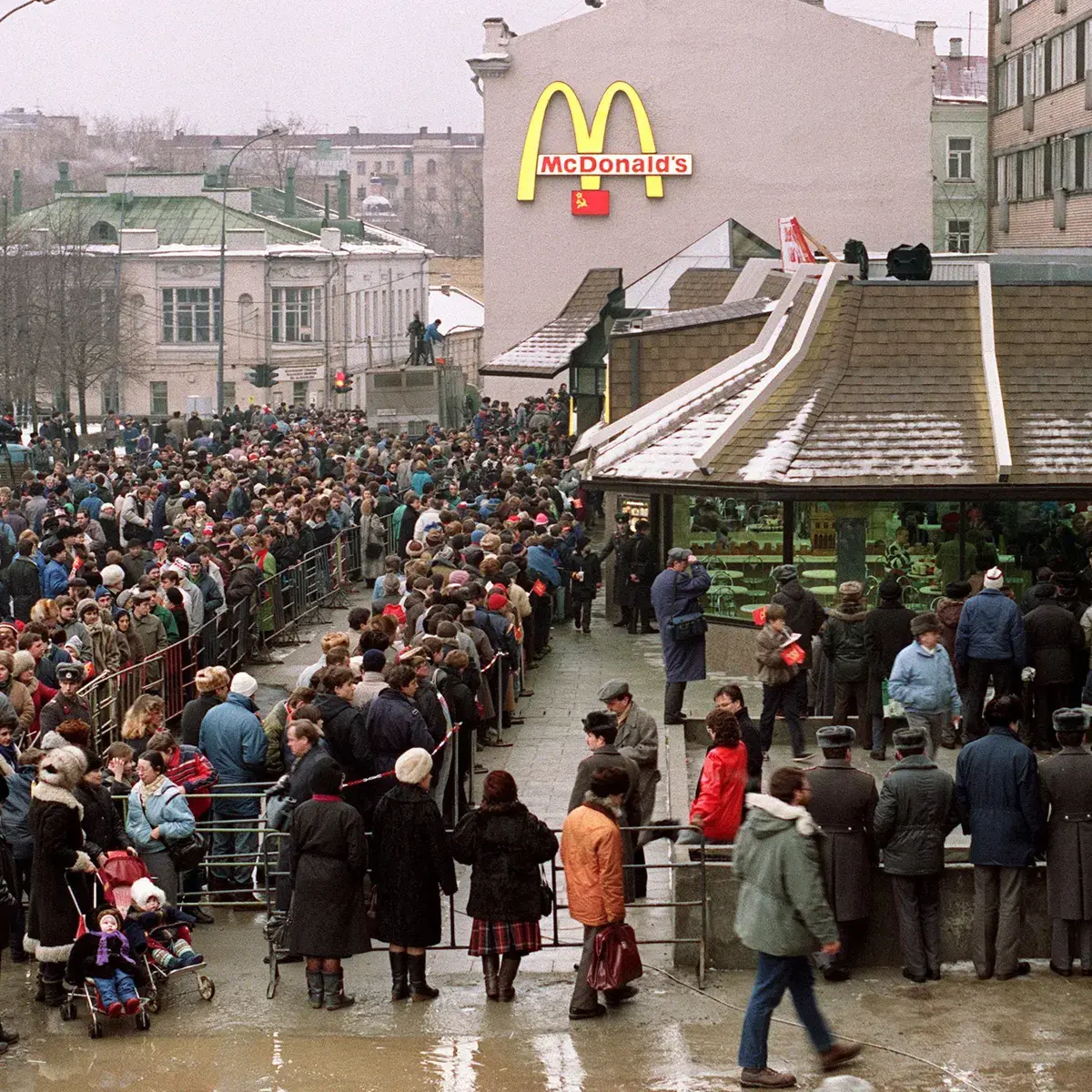
A queue for the first McDonald’s in the Soviet Union
The Mona Lisa
30,000 visitors might sound like a lot, but that’s the same amount of traffic Da Vinci’s Mona Lisa gets on a daily basis. After waiting for hours and hours to see the 77-by-53cm masterpiece behind its protective glass, and most probably through someone else’s iPhone, seems to completely miss the point.
Queueing in Art
In 2003, Slovak conceptual artist Roman Ondak first presented Good Feelings in Good Times, an artificially created queue outside the Kölnischer Kunstverein in Cologne, Germany. The work was afterwards re-enacted at the 2004 Frieze Art Fair in London, where it was purchased by Tate – how it was purchased I’m not sure.
Ondak’s art world stunt highlighted how queues are historically and culturally determined. The artist was born in the Eastern Bloc, where queues were notorious: presumably the behaviour has different associations for the artist than his British audience.
In summary, queueing can be both hellish and fun
But where’s all the build up? Where’s the banter on the way round? If you put ‘queue for the’ in front of items on your bucket list, then you can tick off two at once and live a life that’s twice as rich. I’m should know, I ain’t a funsponge and actually enjoy a bit of queue fun myself: I once waited 60-minutes to catch a 60-second glimpse of the preserved body of Chairman Mao.
It’s highly likely queues predate the French Revolution by a long way – ‘First come, first served’ is surely sacred, ancient lore. The 37,000 disgruntled citizens, who have signed a petition to axe Phil and Holly from their presenterly duties, certainly seem to think so.
For those who do not want to contribute to the ongoing evolution of an epic ritual, to see queueing ‘perfected by practice to the rank almost of an art’, there is always the London Dungeon who recently announced their ‘Holly and Phil pass’ which is ‘here for a limited time only.’ A press release by the Dungeon announced that ‘Guests will have immediate access to the next tour of the London Dungeon, jostling past those peasants who have been patiently waiting their turn.’ You can’t say fairer than feudal.


